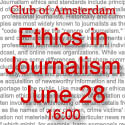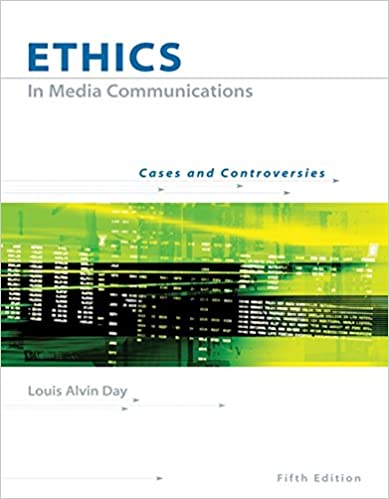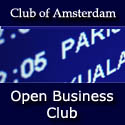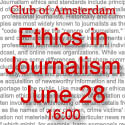
Content
Notes Towards a Literacy for the Digital Age

Notes Towards a Literacy for the Digital Age
by Milverton Wallace, founder/organiser of the European Online Journalism Awards
The kid enters the coffee shop and is greeted excitedly by her friends. They jostle to exchange high fives, knuckle greetings and finger snaps with her.
What is the cause of their admiration? Her Rocaway jeans? Her high tan Jimmy Choo boots? Her Armani sun-glasses? Her Karl Lagerfeld jacket? Nah! It is the gleaming silver object dangling from a pair of white wires plugged into her ears.
It is an iPod, the must-have digital gadget of today’s young people. With this tiny digital audio player Apple stole Napster’s thunder and replaced the CD player as the cutting-edge portable music player of choice.
But if you think this is just another device for playing pre-recorded music, think again. Within two years of the iPod’s debut, developers had created software to allow anyone to produce audio content — words and music — for it and other portable digital players. This technology, known as podcasting, turns consumers into producers, and every wannabe DJ and talk-show host into broadcasters. It is a distribution channel that plugs directly into the hippest, hottest communication network on the planet.
In advanced industrial countries, and increasingly in less-developed regions, social life is being digitised. Cheap camera phones and videocams allow everyday activities to be recorded and stored on personal computers or online services; more and more conversations are conducted via email, IM and SMS; private thoughts, opinions and reflections on public affairs or private passions are instantly posted on weblogs. Because they are in digital form, all these different types of record — moving images, photographs, sounds and texts — can be stored on computers. And the Internet makes it possible for all of this to be shared with family, friends and strangers.
Welcome to the agora of the 21st century, a space where a diverse array of digital modes of communication intersect in cyberspace — email, instant messaging, text messaging, multimedia messaging, weblogging, audioblogging, moblogging, mobcasting, podcasting.
Like it or not, this is the new cultural landscape for learning, entertainment, and communicating with each other. And it is being constructed without consultation with, or permission from, regulatory authorities or self-appointed gatekeepers.
All well and good, but what is the point of all this digital g-soup when school-leavers cannot spell and do sums, or believe Winston Churchill was an insurance salesman? Relax. This is not the end of literacy, just a groping towards a new kind of literacy, which is capable of fulfilling the knowledge acquisition, informational and cultural needs of the digital age.
There is nothing immutable about the mental and manual competences that constitute literacy. What it means to be literate has constantly changed throughout the ages as economic, social and cultural necessities impose new demands on the population. In addition, the number and classes of people, who needed to possess these competences have changed. In ancient Egypt, the ability to read and write, and therefore to manage the state, was a monopoly of the priestly caste and court officials. On the other hand, the assembly, the council and the court, the key institutions of the first democracy in Athens, championed by the literate Pericles, were made up primarily of ordinary people (James 1956) who were mostly educated in the oral, not the literate, culture of 5th century BC Greece. In both cases the vast majority of the people did not need to be literate; you did not need reading, writing and arithmetic to be a farmer, an artisan or a soldier. The same was true in the ancient Chinese, Persian, Babylonian and Roman empires.
The industrial age changed everything. The mass manufacturing of goods, the introduction of machine tools and the technologizing of ancient craft skills required a work force, which could read, write, and do sums. The ceaseless need to innovate in order to remain competitive forced workers to think critically and creatively about the industrial processes in which they were engaged. This led them to invent new goods and technologies to feed the insatiable engine of industrial capitalism. For the first time in human history, education, both literary and technical, became a job requirement.
Thus the invention of printing was a pre-requisite of the industrial age (Eisenstein 1982). Mechanical reproduction of texts was superseded by mass production of books and newspapers to satisfy the growing need for widespread diffusion of the elements of literacy required for industrial production and social advancement.
Mass production of information and knowledge produced the mass media, which by the end of the 19th century became a monolith that controlled access to information about everyday life. Other information monopolies arose during the period, most based on close and exclusive control of specialized knowledge: trade guilds, which regulated the transmission of craft skills; learned societies and associations, which regulated access to scientific information and entry into the professions. These and other institutions were important in codifying and regulating the competences, which powered industrial production and commerce. However, the mass media occupy a special place because of their central role in the organization and control of social communications, and hence the structure of cultural, political and economic life (Innis 1964, 1972).
The trouble with monopolies is not only that they tend to centralize power, but they also wield this power to enforce their definitions of reality on the world. So the scientific establishment decrees that a particular body of knowledge is “science”, and everything else is hocus-pocus; the medical authorities declare that a favoured corpus of practices is “medicine”, and all others are quackery; and the teaching profession holds that literacy is the three “Rs”, and evermore shall it be.
But these edicts are losing their force and authority as people first challenge the information/knowledge monopolies and then develop their own communication media to find things out for themselves and explore truths other than received wisdom or the official version. Rather than the established media talking to them, people are talking to one another in their own self-created space, their own time and at their own speed (Gillmor 2004).
To participate in creating this autonomous space, you must possess not only the print literacy of the industrial age but also the competences required to engage in online conversations and be at ease with using 21st century digital products and services.
What are the competencies that should be …..
| Read the full article: click here |
| Milverton Wallace is a speaker at our event about the future of Journalism – Ethics in Journalism Wednesday, June 28, 2006 Registration: 16:00-16:30, Conference: 16:30-19:15 Where: PricewaterhouseCoopers, Thomas R. Malthusstraat 5, 1066 JR Amsterdam |

Club of Amsterdam blog
 | Club of Amsterdam blog October 26: Synthesis of elBulli cuisine October 14: The new Corinthians: How the Web is socialising journalism September 20: A Future Love Story |
News about the future of Ethics in Journalism

A global survey and case study of atypical work in the media industry, which surveyed 41 journalist member organisations across 38 countries, and which raises fresh concerns over the effect on media quality as the work of journalists is changing.
“The relationship between journalists and work is particularly important given the relationship between media and democracy,” IFJ General Secretary Aidan White said. “If journalists’ employment is precarious and threatened, it is harder for them to resist pressure to shape stories to satisfy governments or commercial interests, it is harder for them to carry out investigative journalism and harder to challenge management’s editorial line.”

Fox, BBC, Al Jazeera most trusted-poll Results of a poll of more than 10,000 adults in 10 countries by the British Broadcasting Corporation, Reuters Group Plc and The Media Center were released on Wednesday, with an additional finding that media worldwide were trusted by an average of 61 percent of respondents compared with 52 percent who said they trusted their governments.”National TV is still the most trusted news source by a wide margin, although the Internet is gaining ground among the young,” said Doug Miller, president of London-based research firm GlobeScan, which conducted the polling.Asked to name the news source they most trusted, without any prompting, 59 percent of Egyptians said Al Jazeera, 52 percent of Brazilians said Rede Globo, 32 percent of Britons said the BBC, 22 percent of Germans said ARD and 11 percent of Americans said Fox News, each leading their respective nations. |
News about the Future

Online Game Market Forecasted to Reach $13 Billion by 2011
According to a new report from DFC Intelligence the worldwide online game market is forecasted to grow from $3.4 billion in 2005 to over $13 billion in 2011. This increase is being driven by the increase in broadband households, higher PC penetration and more connected console video game systems.
The report forecasts that digital distribution will become a very big part of online connectivity. This is more of a retail model with a focus on paying for, not necessarily playing, games online. Furthermore, it can work with the existing retail structure via such mechanisms as consumers buying retail cards that allow for online digital distribution. “Digital distribution and virtual item sales have started to do very well in certain Asian markets and these distribution models are expected to start having increased success on an international basis,” says DFC analyst Alexis Madrigal.

Sending Recorded Messages on Paper
“Audio paper,” which is just 0.75 millimeters thick, is capable of “talking” thanks to the ultra-small speaker, microphone, and battery embedded within it. In the fall of 2005, the postcard-sized Talking Letter, which is made of this paper, went on sale at the Tokyu Hands chain of department stores for ¥1,260 ($10.65 at ¥118 to the dollar) per sheet and was an immediate hit. A message of up to 20 seconds can be recorded on the paper and played back around 50 times just by pushing a button. Talking Letters fit in a standard-sized envelope and can be sent anywhere in Japan with one ¥80 ($0.68) stamp.
Toppan Forms Co., which marketed the product, is currently working on other types of audio paper, such as cards that carry the picture and voice of TV stars or kabuki actors. It is also considering marketing Braille audio paper for people with visual impairments.
Next Event: Wednesday, June 28, 16:30-19:15
the future of Journalism – Ethics in Journalism
When: Wednesday, June 28, 2006, 16:00-19:15
Where: PricewaterhouseCoopers, Thomas R. Malthusstraat 5, 1066 JR Amsterdam

Milverton Wallace, founder/organiser of the European Online Journalism Awards
The new Corinthians versus the standard-bearers: How the web is socialising journalism ethics

Guy Thornton, Chair, Netherlands NUJ Branch
Does and should journalism have boundaries and if so where and how should they be drawn?

Neville Hobson, Accredited Communication Practitioner, ABC
The age of gatekeeper journalism is over

Homme Heida, Promedia, Member of the Club of Amsterdam Round Table
Summit for the Future blog
 | Summit for the Future blog http://summitforthefuture.blogspot.com July 13: Summary of the Summit for the Future 2006 May 22: Dispatches from the Frontier |
Recommended Book

Ethics in Media Communications
by Louis A. Day
Ethics in Media Communications uses case studies throughout each chapter to explore the principles of media ethics. Accessible writing style and coherency between chapters allow for coverage of advanced topics such as morally offensive content and media and privacy.
Development Marketplace — 2006 Winners
Development Marketplace — 2006 Winners
30 projects, recognized for their contribution to the global environment, have been selected as winners in a global competition, Development Marketplace 2006, held at the World Bank and co-sponsored by the GEF. The winners were chosen from 118 projects, drawn from 55 countries.
Among the winners:100 Village Employment and Power Partnerships
To provide rural villages in the very poor rural Bihar region of India with affordable access to electricity.
This project will install biomass power plants. It will work with farmers to ensure the availability of biomass and the cultivation of crops on wastelands that would serve as bio-diesel for the plant. It will work with local micro-entrepreneurs to help them set up income-generating activities (rice mills, pumping for irrigation, briquette production, etc) that would maximize the use of this decentralized energy source.
From Harmful Acquatic Plants to New Cooking Fuel
To remove proliferating invasive aquatic plants from the surface waters of northern Senegal and transform them into combustible pellets that can be used for cooking.
Instead of rotting in the Senegal River and degrading water quality, aquatic plants will be transformed into fuel pellets for cooking – replacing wood and charcoal – and thus contributing to the fight against desertification. The larger environmental health benefits are expected to be reaped by the 600,000 people living in the low valley of the Senegal River.
Rural Milk Collection Center – ISAAC Solar Icemaker
To enhance the incomes of small-scale dairy farmers in Kenya by establishing milk collection centers near rural communities that will use solar-powered technology to chill and store excess milk.
Using solar power and ammonia absorption technology, the ISAAC Solar Icemarker can chill up to 100 liters of milk a day.
Dairy production is one of the largest contributors to Kenya’s agricultural GDP. Without the capacity to chill excess milk, farmers are currently depleting surrounding forests as they use firewood to boil and pasteurize milk.
Code of Ethics
Preamble
Members of the Society of Professional Journalists believe that public enlightenment is the forerunner of justice and the foundation of democracy. The duty of the journalist is to further those ends by seeking truth and providing a fair and comprehensive account of events and issues. Conscientious journalists from all media and specialties strive to serve the public with thoroughness and honesty. Professional integrity is the cornerstone of a journalist’s credibility. Members of the Society share a dedication to ethical behavior and adopt this code to declare the Society’s principles and standards of practice.
Seek Truth and Report It
Journalists should be honest, fair and courageous in gathering, reporting and interpreting information.
Journalists should:
- Test the accuracy of information from all sources and exercise care to avoid inadvertent error. Deliberate distortion is never permissible.
- Diligently seek out subjects of news stories to give them the opportunity to respond to allegations of wrongdoing.
- Identify sources whenever feasible. The public is entitled to as much information as possible on sources’ reliability.
- Always question sources’ motives before promising anonymity. Clarify conditions attached to any promise made in exchange for information. Keep promises.
- Make certain that headlines, news teases and promotional material, photos, video, audio, graphics, sound bites and quotations do not misrepresent. They should not oversimplify or highlight incidents out of context.
- Never distort the content of news photos or video. Image enhancement for technical clarity is always permissible. Label montages and photo illustrations.
- Avoid misleading re-enactments or staged news events. If re-enactment is necessary to tell a story, label it.
- Avoid undercover or other surreptitious methods of gathering information except when traditional open methods will not yield information vital to the public. Use of such methods should be explained as part of the story
- Never plagiarize.
- Tell the story of the diversity and magnitude of the human experience boldly, even when it is unpopular to do so.
- Examine their own cultural values and avoid imposing those values on others.
- Avoid stereotyping by race, gender, age, religion, ethnicity, geography, sexual orientation, disability, physical appearance or social status.
- Support the open exchange of views, even views they find repugnant.
- Give voice to the voiceless; official and unofficial sources of information can be equally valid.
- Distinguish between advocacy and news reporting. Analysis and commentary should be labeled and not misrepresent fact or context.
- Distinguish news from advertising and shun hybrids that blur the lines between the two.
- Recognize a special obligation to ensure that the public’s business is conducted in the open and that government records are open to inspection.
Minimize Harm
Ethical journalists treat sources, subjects and colleagues as human beings deserving of respect.
Journalists should:
- Show compassion for those who may be affected adversely by news coverage. Use special sensitivity when dealing with children and inexperienced sources or subjects.
- Be sensitive when seeking or using interviews or photographs of those affected by tragedy or grief.
- Recognize that gathering and reporting information may cause harm or discomfort. Pursuit of the news is not a license for arrogance.
- Recognize that private people have a greater right to control information about themselves than do public officials and others who seek power, influence or attention. Only an overriding public need can justify intrusion into anyone’s privacy.
- Show good taste. Avoid pandering to lurid curiosity.
- Be cautious about identifying juvenile suspects or victims of sex crimes.
- Be judicious about naming criminal suspects before the formal filing of charges.
- Balance a criminal suspect’s fair trial rights with the public’s right to be informed.
Act Independently
Journalists should be free of obligation to any interest other than the public’s right to know.
Journalists should:
- Avoid conflicts of interest, real or perceived.
- Remain free of associations and activities that may compromise integrity or damage credibility.
- Refuse gifts, favors, fees, free travel and special treatment, and shun secondary employment, political involvement, public office and service in community organizations if they compromise journalistic integrity.
- Disclose unavoidable conflicts.
- Be vigilant and courageous about holding those with power accountable.
- Deny favored treatment to advertisers and special interests and resist their pressure to influence news coverage.
- Be wary of sources offering information for favors or money; avoid bidding for news.
Be Accountable
Journalists are accountable to their readers, listeners, viewers and each other.
Journalists should:
- Clarify and explain news coverage and invite dialogue with the public over journalistic conduct.
- Encourage the public to voice grievances against the news media.
- Admit mistakes and correct them promptly.
- Expose unethical practices of journalists and the news media.
- Abide by the same high standards to which they hold others.
Genetic Testing in Sports
Genetic Testing in Sports
Jed Shimizuin mentions in his article his article about
| “Would you prefer a power athlete, maybe a sprinter, or would you rather your child be tailored for endurance? For that option, perhaps they would look at tinkering with the ACTN3 gene, which encodes the muscle fiber protein alpha-actinin-3. As it turns out, you could probably already predict genetic predisposition of muscles for either power or endurance. There is evidence for certain alleles of the ACTN3 gene (alleles being different variants of a gene) are more prominent in different types of athletes, as shown in Yang et al. (2003).” |
| Andy Miah and E. Rich (2006) |
| Genetic Tests for Ability? Talent Identification and the Value of an Open Future, Sport, Education and Society, in press. |
This paper explores the prospect of genetic tests for performance in physical activity and sports practices. It investigates the terminology associated with genetics, testing, selection and ability as a means towards a socio-ethical analysis of its value within sport, education and society. Our argument suggests that genetic tests need not even be used (or widely used) as a tool for talent identification to have an impact on the way in which abilities are recognised and celebrated within sport. Just the development of these tests may consolidate discourses associated with performance and techno-scientific views of the bodies which are drawn upon in selecting, labelling and position some, rather than others, as ‘able’. The attachment of sports institutions to these technologies which may be helping to shape a theoretical and wider social construction of how performance is viewed. Our paper problematises the place that such testing may assume in the culture of physical activity and potentially physical education. In doing so, we explore how the development of these tests may impact educational practices related to sport in two keys ways. Firstly, the direct impact in terms of the ways in which the ways in which information from these tests may be used to influence the sports experience of young people, within both physical education and sports arenas. Secondly, we consider how, on a broader level, the increasing importance given to genetic science may be (re)constructing wider social understandings of the nature of ‘ability’ within sport and physical activity. Our response to these developments extends Feinberg’s thesis on an ‘open future’, which argues that selecting the characteristics of children would be unacceptable on account of it diminishing the openness of that child’s future – the range of prospects they might encounter that could lead to the flourishing of their life. On this view, we argue that genetic tests for performance might violate the child’s right to an open future and that this concern should be taken into account when considering how and whether such tests should be used. |
| Stefanie Olsen in her article |
| Knowledge is power, but can you handle it? |
“The Internet is allowing consumers direct access to genetic testing–if they want it. Nearly a dozen direct-to-consumer gene testing companies are giving people the ability to send a blood sample or a swab of saliva to a lab to learn about their genetic predisposition for diseases like ovarian cancer.”Knowledge is power,” said Ryan Phelan, founder and CEO of DNAdirect, an Internet-based gene-testing and counseling service, which launched in March 2005. “Genetics is the next tool out there for consumers.”DNAdirect, a privately held company in San Francisco, sells tests for diseases that Phelan said could have therapeutic possibilities, like a predictive genetic test to determine the likelihood of developing breast cancer.” Gail Javitt, law and policy director for the Genetics and Public Policy Center at Johns Hopkins University, doesn’t point specifically to DNAdirect, but said the whole enterprise of gene testing lacks uniformity when it comes to establishing basis for administering a specific test and then delivering counseling for the results. Online operations carry the same risks.”Our fundamental concern is about the quality of the underlying genetic tests because there is generally little oversight over the whole enterprise, and that makes it challenging for consumers to separate the wheat from the chaff,” Javitt said. |
Agenda
June 28
the future of Journalism
Ethics in Journalism
Where: PricewaterhouseCoopers, Thomas R. Malthusstraat 5, 1066 JR Amsterdam
Club of Amsterdam Open Business Club
 | Club of Amsterdam Open Business Club Are you interested in networking, sharing visions, ideas about your future, the future of your industry, society, discussing issues, which are relevant for yourself as well as for the ‘global’ community? The future starts now – join our online platform … |




Customer Reviews
Thanks for submitting your comment!